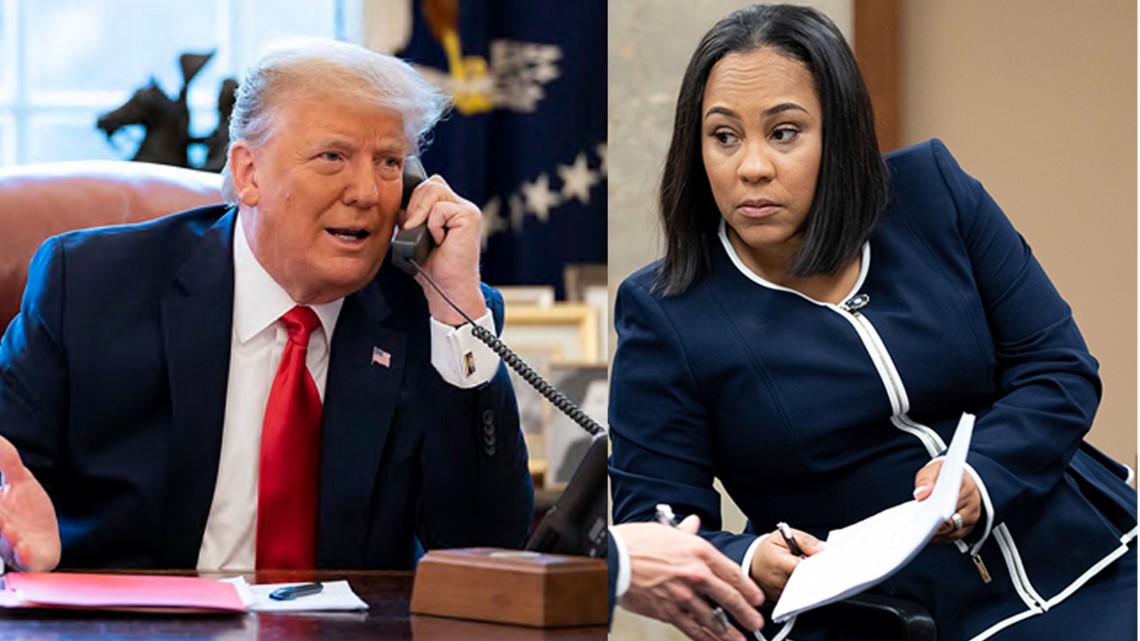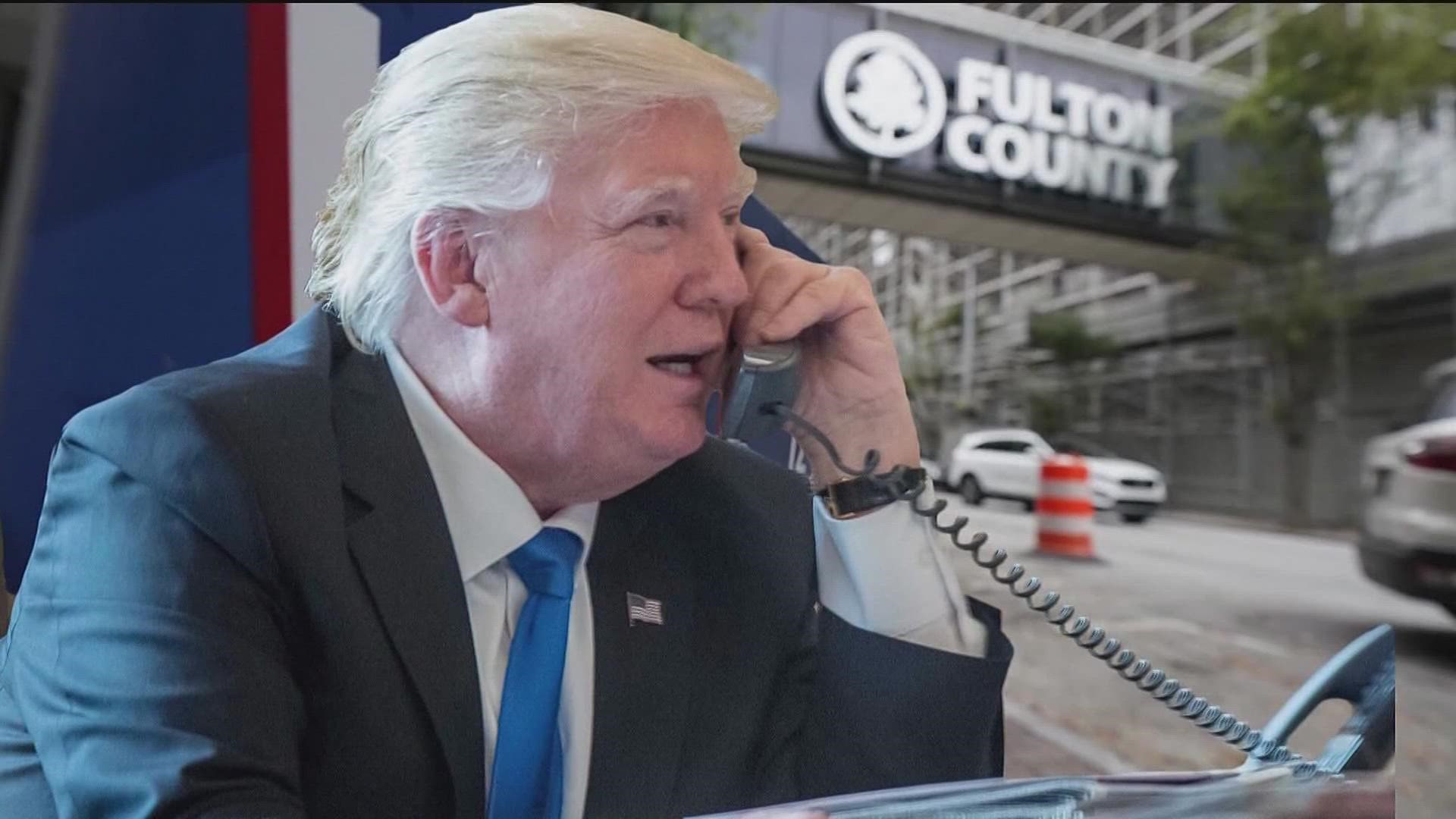ATLANTA — As a crucial court hearing looms, Fulton County prosecutors now have the final report written by the special purpose grand jury investigating possible criminal interference in Georgia's 2020 election by former President Donald Trump and his allies, sources tell 11Alive.
The report could be released as early as this month, further in the future, or perhaps not at all as legal fights play out.
Fulton County Superior Court Judge Robert McBurney, who's overseen the jury's work, called for a Jan. 24 hearing where the media, the district attorney's office, and — possibly — targets of the investigation will argue over how much of the report is released.
It's unclear what will be included in the final report or if criminal charges will be recommended against the former president or those close to him. Two legal experts who spoke with 11Alive also differed on whether the special purpose grand jury could attach particular crimes to particular names in the report.
The Fulton County Special Purpose Grand Jury lacks the power to indict. Fulton County District Attorney Fani Willis would have to take the case to a separate, regular grand jury to seek criminal charges.
"This is very rare," said Peter Skandalakis, the Executive Director of Prosecuting Attorneys’ Council of Georgia and former District Attorney of Coweta Judicial Circuit. "You don't see a lot of special grand juries in Georgia."
What we know
Fulton County Superior Court judges voted in January 2022 to impanel the grand jury at Willis' request. The body began its work in May 2022, eight months ago.
The jury was dissolved Jan. 9 after it completed the report and a majority of county superior court judges concluded the panel's was finished.
The final report will include a summary of the grand jury's findings. Events like Trump's Jan. 2, 2021 call to Georgia Secretary of State Brad Raffensperger where the then-president asked the state's top election official to "find" enough votes to change the outcome are expected to be a key focus.


The 23-person jury interviewed several key figures including Raffensperger, Georgia Gov. Brian Kemp, former White House Chief of State Mark Meadows, U.S. Sen. Lindsey Graham and Rudy Giuliani.
The scope of its investigation was broad.
The order creating the grand jury states that it had the authority to investigate "any and all facts and circumstances relating directly or indirectly to alleged violations of the laws of the State of Georgia" tied to the 2020 presidential election.
What's left to be answered
We don't know if or how much of the report will be made public.
It's unclear if the grand jury's report is considered a presentment — a specific type of grand jury report — under state law. In his order dissolving the grand jury and setting the Jan. 24 court hearing, McBurney said that question is unresolved.
That decision could come next week.
State law allows the special purpose grand jury to recommend publication of presentments, and the judge overseeing the proceedings "shall order the publication as recommended." The jury recommended that the report be published.
Anthony Kreis, a Georgia State University College of Law professor who specializes in constitutional law, told 11Alive that more of the document could be shielded from the public if McBurney rules the report is not a presentment.
"McBurney has ... shown a lot of prudence in making sure that everything is addressed and nothing is overlooked," Kreis said. "Because it's such a rarely used option, there's not a lot of precedence involved. I think he's trying to be extra cautious."
Two legal experts who spoke with 11Alive disagreed on whether the special purpose grand jury had the authority to allege certain people committed a particular crime under state law.
The order that formed the grand jury stated that the body "may make recommendations concerning criminal prosecution as it shall see fit."
Skandalakis, the Executive Director of the Prosecuting Attorneys’ Council of Georgia, told 11Alive there's case law in Georgia that prevents a grand jury from making disparaging remarks without issuing an indictment.
"If they are naming names and making allegations of criminal conduct, I do not think it is appropriate to have that in a grand jury report," Skandalakis said. "This grand jury does not have the authority to do that."
Skandalakis previously used a special purpose grand jury during his time as the Coweta circuit's top prosecutor.
His office, the Prosecuting Attorneys' Council of Georgia, will also determine if Lt. Gov. Burt Jones should be investigated by a special prosecutor. Willis was disqualified from prosecuting Jones after she took part in a fundraiser for Democratic Lt. Gov. nominee Charlie Bailey.
Skandalakis told 11Alive that the office's decision on Jones would come after seeing what's included in the grand jury report.
In a previous interview with 11Alive, former Gwinnett District Attorney Danny Porter said that there are ways for grand juries to legally criticize a person without indicting them.
Porter used two special purpose grand juries during his nearly three decades as the county's top prosecutor.
"I felt like my only role in it was to make sure it was legal," he previously said. "I didn't want to put words in their mouth. Some DAs don't have any involvement. Most DAs did what I do which is an advisory role."
This is a developing story. Check back often for new information.
Also download the 11Alive News app and sign up to receive alerts for the latest on this story and other breaking news in Atlanta and north Georgia.

